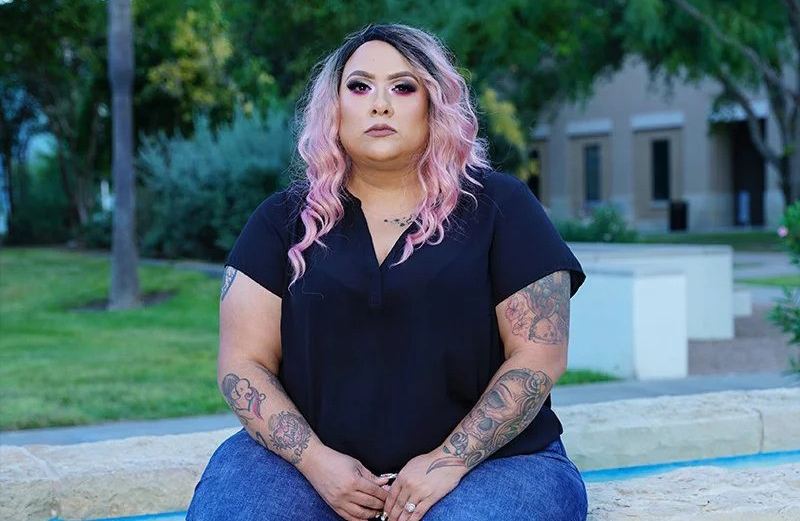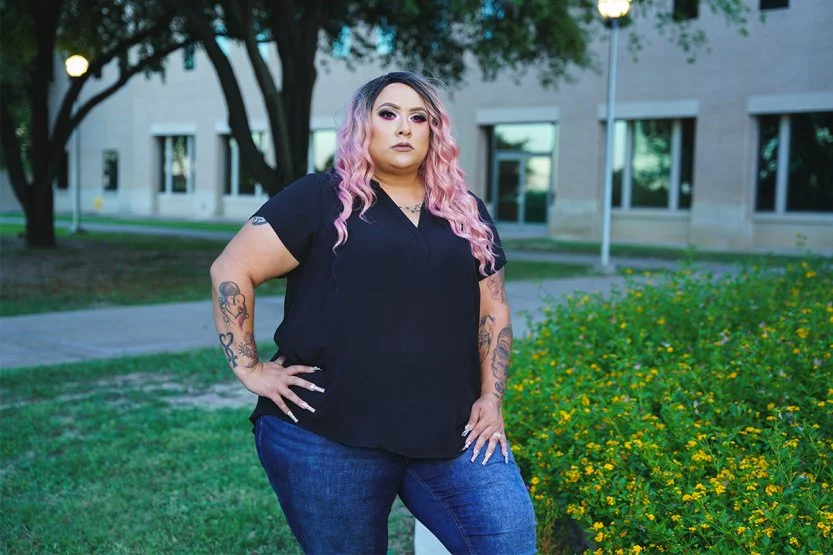Priscilla Villarreal, known to her 214,000 Facebook followers as “La Gordiloca” or “the big crazy lady,” was arrested in 2017 for releasing on her Facebook page “Lagordiloca News LaredoTx,” the name of a U.S. Border Patrol agent who committed suicide. Villarreal contacted a Laredo Police Department (LPD) officer seeking the agent’s name, shared it before the police issued a formal statement, and was later arrested and charged with a felony.
While the criminal charges against Villarreal were dropped, she filed suit against the LPD, the City of Laredo, Webb County, the local district attorney and others involved in her arrest. The lawsuit, filed in the U.S. District Court for the Southern District of Texas in May 2019, argued that the LPD infringed upon her First Amendment right to free speech and press.
“Defendants’ unconstitutional conduct, if left unchecked, could ensnare and chill any journalist—professional or citizen—who lawfully gathers newsworthy information and happens to disseminate it before government officials do the same,” the complaint stated. “The Constitution demands that such conduct be deterred.”
The Texas law in which Villarreal was charged, Texas Penal Code 39.06 (c), states that a person commits a Class 3 felony if they “solicit or receive from a public servant information that (1) the public servant has access to by means of his office or employment; and (2) has not been made public,” according to the complaint. But, this information must also be solicited “with intent to obtain a benefit or with intent to harm or defraud another.”
Villarreal’s case pits free speech against the qualified immunity protections of public officials. The U.S. Court of Appeals for the Fifth Circuit reviewed her case in January 2023, but this past January, in a 9-7 decision, the Fifth Circuit ruled that the parties Villarreal sought to sue were entitled to legal immunity.
“Villarreal and others portray her as a martyr for the sake of journalism. That is inappropriate,” Judge Edith Jones wrote for the majority. “She could have followed Texas law, or challenged that law in court, before reporting nonpublic information from the backchannel source.”
Villarreal’s attorney, JT Morris from the Foundation for Individual Rights and Expression (FIRE), has filed a petition for Supreme Court review. First Amendment Watch spoke with Morris about Villarreal’s case, its First Amendment implications, and the status of protections for citizen journalists like Villarreal.
Editor’s note: This interview has been edited and condensed for length and clarity.
FAW: What is the central question of this case? Why is it important?
JM: I think there’s two main issues in this case. The first one: Can the government arrest somebody simply for asking questions of public officials? And two: When they do so, can Americans hold them accountable through lawsuits under the Civil Rights Act of 1871?
FAW: What specific First Amendment protections apply to Priscilla’s newsgathering in this case?
JM: A fundamental and core right of the First Amendment is the right to ask government officials questions. Self government would be pretty worthless if people couldn’t ask public servants and elected officials questions about the government and the information they have. And that would really eviscerate a free press and an effective press, if the press couldn’t ask questions of the government and then publish what those officials share.
FAW: How does qualified immunity apply here? Is it difficult to claim First Amendment protections when alleged infringement is done by a public official?
JM: Qualified immunity is one of the core issues in this case. And certainly, our position is that this was such an obvious violation of the First Amendment, throwing somebody in jail because they asked a government official for newsworthy information, that qualified immunity shouldn’t apply. It doesn’t take a law degree, it doesn’t take much more than basic knowledge of American principles and constitutional principles to know that you can’t arrest people because of inquiries of the government.
FAW: In August 2022, U.S. Circuit Judge James C. Ho wrote for the Fifth Circuit that “If the First Amendment means anything, it surely means that a citizen journalist has the right to ask a public official a question, without fear of being imprisoned.” But an en banc hearing vacated that decision. How did the appeals court see the issue in a different way?
JM: You had a really splintered court. You had nine judges saying that the officials who arrested Priscilla had qualified immunity, and seven who said, “No, they don’t.” A lot of the dispute here came down to how the majority viewed the First Amendment, and really viewed the First Amendment as it interplays with the Fourth Amendment. The majority sort of looked at this and said, “Well, these officials might have had probable cause that fit the elements of this arresting statute,” this Texas statute, which makes it a felony just to ask for information that the government considers non-public. And so they said, “Well, as long as you can satisfy the probable cause question, that’s enough. We don’t even really need to reach the First Amendment issue.” That’s problematic for two reasons. One, probable cause can never be based on the exercise of the First Amendment right. And two, as Judge Ho said in his dissent, it turns the First Amendment into a second class right. What’s really interesting about that is if you look at the history of the Fourth Amendment, it was born out of lessons that the founders learned from England, where you had officials there going after the press with warrants because they were retaliated against in silencing the press. So to sort of subvert the First Amendment to things like probable cause and warrants just isn’t even borne by history, let alone decades of First Amendment jurisprudence from the Supreme Court.
FAW: In the recent Fifth Circuit decision in January, Judge Edith Jones wrote that Villarreal “could have followed Texas law, or challenged that law in court, before reporting nonpublic information from the backchannel source.” How is what Villarreal did different from typical, investigative journalism?
JM: It’s not. It’s what millions of journalists do all the time. They go out, they source information, they verify it, and part of that necessarily has to include government sources, because one of the core functions of a free press is to check the government. If Villarreal was forced to follow Texas law, she couldn’t have done her job, because if you apply this Texas statute to journalists, you’re essentially eviscerating the very function of journalism, which is to go out and ask government officials hard questions. And if she had to wait for a court order, that would mean she would necessarily have to self censor, just for a court to tell her that the statute didn’t apply to routine journalism that’s so squarely protected under the Constitution.
FAW: Are her First Amendment rights different from that of a journalist from a traditional outlet? With the rise of citizen journalism (and the decline of more traditional outlets), can we even define who is a journalist? Should their rights be any different?
JM: I think the rights are one and the same. Whether you’re a traditional journalist or you’re a citizen journalist like Priscilla, or you’re a concerned parent going to your local school board and asking questions about the curriculum, Americans have a constitutional right to ask their governments questions, and when the government shares information in response to those questions. Americans have a constitutional right to publish and share that information with their fellow citizens. So whether you call it newsgathering or questioning the government, the First Amendment protects it.
FAW: How do you intend to address the Fifth Circuit’s argument in order to get a good outcome for Priscilla’s newsgathering rights?
JM: We’ve started with our petition to the Supreme Court. We’ve laid out the reasons why the court should take Priscilla’s case. One, we’ve said, this is an obvious First Amendment violation. You can’t put people in jail when they ask questions of the government. And two, we’ve said, qualified immunity simply doesn’t apply here. Government officials can’t try to shroud very clear First Amendment violations in a state statute and avoid accountability for it. Section 1983 has to mean something, and it has to give, whether you’re a journalist or just an everyday American, it has to give those people the right to seek remedies and hold officials accountable when they stomp on very well settled and familiar First Amendment rights like the ones Priscilla exercised here.
FAW: How did this 23-year-old law, which according to your 2019 lawsuit, has never been used, come to be applied to Villarreal’s case?
JM: Just to clarify, it’s never been used locally. There’s a handful of prosecutions under it in other parts of Texas, but I think what those prosecutions show is why the statute was so misapplied. When you read the law, it’s really clearly intended for things like bid rigging and extortion, getting information from the government to do other bad things that corrupt the government and harm people’s trust and their elected officials. Exactly the opposite of how the law was applied here, where you have a journalist going out and asking government officials questions in a way, not only that is important for effective journalism, but that the Constitution protects. I think the law, whatever the officials did here, they found this law, and they found that maybe the elements of the law technically fit everyday journalism. Well, that’s a real constitutional problem. And I think you know most most officials, whether you’re a reasonably trained police officer or a prosecutor, you’re going to know looking at that law that, “Hey, I can’t enforce this against what I know is just routine journalism.” That’s exactly what Priscilla did here when she reported these stories that led to her arrest.
FAW: More than a dozen amicus briefs have been filed in support of Villarreal in her petition to the Supreme Court. Do you expect the high court to take up the case?
JM: I think the fact that you have, in the Fifth Circuit, you had seven dissenting justices across four opinions. You have 41 amicus across 13 briefs at the petition stage. That shows this is an important issue. It shows that people feel strongly and rightfully, feel strongly about Priscilla’s rights, and ensure not only Priscilla’s rights, but the rights of every American are protected against very blatant First Amendment violations, like the one that happened here.
More on First Amendment Watch:


